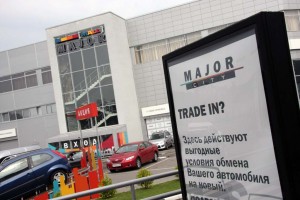
GM is one of several makers to cut off shipments to dealers like Moscow's Major, while others are sharply rising prices as the ruble collapses.
What seemed like a dream market just a few years ago has now turned into a nightmare, the Russian economic meltdown sending automakers from around the world into a scramble.
With economic sanctions already taking a serious toll, this past week’s collapse of the ruble has led General Motors, Audi and Jaguar Land Rover to temporarily halt sales in the heart of the former Soviet Union. Nissan, meanwhile, has decided to limit sales of some models and raise prices on others.
“When the ruble sinks it’s a bloodbath for everybody,” said Carlos Ghosn, CEO of the Renault-Nissan Alliance., which is the biggest maker in Russia along with its local partner Avtovaz. “It’s red ink, people are losing money, all car manufacturers are losing money.”
Russian car sales have been on a rollercoaster ride for several years, making it difficult for manufacturers to plan, never mind make money on their Russian operations. But the situation began to grow dire when the country was slapped with a series of increasingly tough sanctions over its annexation of Crimea and involvement in Ukraine’s civil war.
(Takata says it will do more to solve airbag problems – but won’t expand recall. Click Herefor more.)
During the first 11 months of the year market was already down 12% from 2013’s weak demand, according to industry data – and that was before the latest economic crisis that has seen the ruble slide to its lowest-ever level. It plunged to around 68 to the dollar on December 17th, rebounding to 61 on Friday the 18th. But that is still down by more than 50% compared with the dollar-ruble exchange rate in mid-September.
Earlier this autumn, Ford Motor Co. warned that the slump in Russia was a key reason why the maker’s European operations wouldn’t achieve the turnaround anticipated this year – an announcement that sent the maker’s stock tumbling.
Even before the ruble went into freefall, Ford sales were off 50% year-over-year. The maker has so far cut 950 jobs at its St. Petersburg assembly line and another plant. It also took a $329 million write-down in the value of its Russian operations.
Ford is continuing – so far – to ship vehicles to its dealers. But other makers are taking more drastic action.
GM, which had already laid off over 500 workers at its own St. Petersburg plant, cutting out an entire shift, had earlier taken “drastic pricing actions,” according to Michael Lohscheller, the Chief Financial Officer for GM’s European Opel Group. On Tuesday, the maker halted shipments to dealers entirely to “manage its business risk,” it said in an e-mail.
Audi also halted sales on December 16th, the day the ruble’s fall turned into a rout. It plans to halt production at its plant in Kaluga from December 22 to January 12, and will raise prices when it resumes shipments.
Jaguar Land Rover is temporarily halting sales, as well. And it is expected to raise prices to compensate for the weakened ruble, as are other manufacturers.
(Dutch sports car company Spyker goes bankrupt – but vows to return. Click Here for the latest.)
BMW has acknowledged it will lose between 100 million and 150 million euros ($123 million to $185 million) during the fourth quarter due to the exchange rate crisis. The maker has been shifting production to other, more lucrative markets, creating some shortages at Russian dealerships, according to various reports.
Asian makers also are feeling the pinch. “We will be forced to implement price increases to adjust to market prices but have not yet finally decided by how much or when exactly — but soon,” Toyota spokesman Jen-Yves Jault told the Associated Press. The Japanese giant does not plan to suspend sales, but, like other makers, expects price hikes will further weaken demand.
How long might the Russian mess last? During a speech this week, President Victor Putin offered a few possible signs he is ready to work with critics to resolve the Ukranian crisis. At the same time, the White House suggested it could ramp up current sanctions.
From an automotive perspective, IHS Automotive analyst Tim Urquhart is not upbeat, cautioning, “With the ruble having lost around half its value against the dollar since the start of the year, and the economic stability that has been the cornerstone of the Putin administration under threat, it is likely that OEMs will look further at revising their Russian business strategies in the coming weeks and months.”
(Is Tesla stock about to melt down as low gas prices cut into battery-car sales? Click Here for the story.)

I’m sure that many people will suffer the consequences of sanctions for the corrupt Russian government’s imperialistic activity. Russia should also be held accountable by the international community for providing the weapons for Russian backed rebels to shoot down a civilian airplane killing hundreds of innocent people. Unfortunately the actual criminals in Russia’s government will not suffer, just the average person or those who do Biz in Russia.